Our 2020 Food and Farming Holiday Book Gift Guide – Civil Eats
In an unprecedented year, we found solace and inspiration in some wonderful food and farming books, and once again, we’re excited to share some of our favorites. Here are 28 books designed to broaden your knowledge base, introduce you to powerful new voices, and deepen your understanding of food and agriculture in this challenging but pivotal moment.
Books We Read
How to Eat: All Your Food and Diet Questions Answered
By Mark Bittman and Dr. David Katz
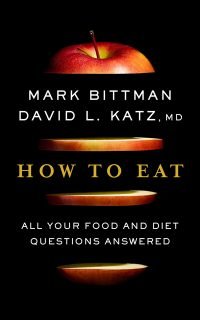
Is breakfast actually the most important meal of the day? Is there a best way to brew coffee? Should I only buy organics? What’s the best cooking oil? In How to Eat, cookbook author and former New York Times columnist Mark Bittman and health expert Dr. David Katz team up to answer questions about all aspects of the human diet. They approach the task in an engaging, easy-to-digest Q&A format, covering fads like the Paleo and Keto diets; lifestyle and dietary choices like when to eat, how to snack, and the importance of local food; the health benefits of foods including beans, smoothies, fish, and meat alternatives; and the details about nutrients like protein, carbs, salt, sugar, and cholesterol. Throughout, the authors point readers toward foods that are “close to nature, minimally processed, and plant predominant”—a set of guidelines many of us are probably already aware of. But they also parse other nitty-gritty aspects of diet, which is where readers may find the most revelations. For example, they write that while coffee is associated with long-term net health benefits (great news!), they recommend cheese only in very small quantities, if at all. Their answers are conversational and to-the-point as they encourage readers to rely on science and common sense when making decisions about what we put in our bodies.
– Christina Cooke
Diners, Dudes, and Diets: How Gender and Power Collide in Food Media and Culture
By Emily Contois
The bulk of the 21st Century has seen food media and marketing under the thrall of “the dude.” Look no further than the rise of Guy Fieri, who brought dudely defiance to the world of cooking, or the launch of products like the Bake It Like A Man cookbook and Coke Zero, which sought to give men cover while indulging in previously feminized foods and pastimes. Sociologist Emily J. Contois explores how cultural forces have reinforced the food gender binary over the last 20 years, and how economic forces have driven food corporations to make absurdly gendered products like Powerful Yogurt, which has a container designed to resemble molded six-pack abs.
As a survey of a generation worth of food marketing and messaging, the book offers a useful overview of how corporations package food, identity, and gender norms for consumption. Perhaps even more valuable, and hopeful, is the closing section, “Dude, What Happened?” which explores how the election of Donald Trump, the #MeToo movement, and the pandemic have caused many of the companies with the most egregiously gendered approaches to food to seek more neutral, inclusive territory.
– Matthew Wheeland
Grassroots Rising: A Call to Action on Climate, Farming, Food, and a Green New Deal
By Ronnie Cummins

Author and activist Ronnie Cummins sees potential for a better world as the planet teeters on the edge of ecological collapse—and he wrote Grassroots Rising to deliver that hopeful stance. An instructional read that offers a “practical, shovel-ready plan,” Cummins articulates a passion-driven call to action. Designed to inspire readers around the world to participate in as well as organize to create a more resilient world, Grassroots Rising takes readers through four drivers of change—consumer activism, farm-based innovation, political change, and regenerative finance—as stepping stones on the path to a global “Regeneration Revolution.” The plan Cummins outlines is seductive in its ease, asserting that the solutions we need are already available: ditching genetically engineered foods and shifting to regenerative, organic farming in alignment with the goals of the Green New Deal. As he sees it: all we have to do is commit and act.
– Cinnamon Janzer
Bite Back: People Taking On Corporate Food and Winning
Edited by Kathryn De Master and Saru Jayaraman

Bite Back is a book for the present moment. Many of the issues that the authors set out to illuminate for their readers—particularly workers’ rights and the poverty–hunger connection—have been thrust to center stage as the pandemic upended our regularly scheduled programming. The structure of the book also calls to mind the many ways that mutual aid and people power have been on display throughout 2020. Each chapter consists of a “Call to Action” that lays out the landscape of a topic, followed by a “Collective Response” that explains how people are organizing to respond, resist, and redirect toward the greater good. Every topic covered by the book’s contributors—corporate control of the global seed supply, pesticides, fast food, and food sovereignty, to name a few—will be familiar to many Civil Eats readers. But by highlighting the ways that individuals and organizations are uniting to create positive change, Bite Back offers empowering and inspiring examples of collective action that take the reader deeper.
– Matthew Wheeland
Welcome to the Agrihood: Housing, Shopping, and Gardening for a Farm-to-Table Lifestyle
By Anna DeSimone
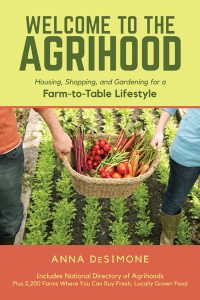
Part travel guide, part how-to manual, Anna DeSimone’s Welcome to the Agrihood offers a starting point for anyone who’s ever stared at a carrot in the supermarket and wondered about the story behind it. While this book is full of information and tips about agrihoods—housing developments designed around farms—it’s also meant to be a reference book that covers everything from rooftop farms to food miles, composting, planting guides, and more.
– Bridget Shirvell
How to Be A Conscious Eater: Making Food Choices That Are Good for You, Others, and the Planet
By Sophie Egan
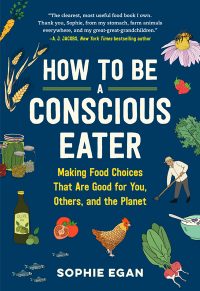
It’s easy to feel overwhelmed by the vast amounts of information out there about what to buy, cook, and eat, but this book aims to clear up the confusion in just 270 pages. How to Be A Conscious Carnivore is a user-friendly handbook that distills the facts on food without oversimplifying or rulemaking. This color-coded guide is organized by food source—from the ground, from animals, factories, and restaurant kitchens—complete with illustrations and takeaways. It tackles the most pressing questions on 60 topics, from farmed fish and egg labels to cooking oils and single-use plastics. Deftly avoiding fads and hype, author Sophie Egan, a food systems consultant and contributor to the New York Times’ Well blog, has packed this book with straight-forward, user-friendly information for good health and sustainability.
– Lynne Curry
The Growing Season: How I Built a New Life–and Saved an American Farm
By Sarah Frey

If you’ve bought a carving pumpkin or a melon from a big-name supermarket lately, there’s a good chance it came from Frey Farms. The southern Illinois farm is one of America’s largest produce growers and shippers, but that wasn’t always the case. At the age of 18, Sarah Frey, the youngest of 21 children, bought what was then a struggling operation and created her own company. The Growing Season: How I Built a New Life-and Saved an American Farm is Sarah’s story. The book is no fairytale. While it’s a quick read, even hard to put down at times, Frey doesn’t sugar-coat the farm’s state in those early years, the challenges she faced, the skills it took to overcome them, or the missteps she made along the way. The writing is charming, earnest, and funny, and while it offers a glimpse into a farm success story it also takes an honest look at many of the hardships modern farming.
– Bridget Shirvell
Black Food Matters: Racial Justice in the Wake of Food Justice
Edited by Hanna Garth and Ashanté M. Reese

The story of America’s food system is driven by the violent subjugation and ongoing exploitation of Black people. It is also a story of resilience, culture, and foodways. Through ethnographic study and academic analysis, Black Food Matters centers Black voices in describing that reality. In a series of 10 essays, scholars examine everything from how Black women in Detroit farm as an act of resistance to how the movement for food sovereignty drives collective agrarianism in a small South Carolina town and how Black food entrepreneurs in Washington, D.C. get overlooked in conversations about neighborhood food “access.” And in a dispatch from Los Angeles, readers see how the city’s “food justice” landscape includes both grassroots work rooted in the Black Panther Party’s recognition of hunger as oppression, as well as work that denigrates Black foodways and culture under the guise of promoting “healthy eating.” While Black Food Matters was conceived of and written before 2020, its publication meets the moment perfectly. As efforts to address racial justice arise out of the year’s ongoing violence and protests, it could serve as a crucial tool for educators, activists, journalists, and policymakers to better understand the ways in which, as the editors write, “Blackness is a foundation upon which American food culture was built.”
– Lisa Held
The Future-Proof Farm: Changing Mindsets in a Changing World
By Steve Groff

As the climate crisis threatens the global food systems, soil health is at a tipping point for a range of intertwined reasons. Farmer and entrepreneur Steve Groff has been ringing the alarm bells for decades, and The Future-Proof Farm offers urgently needed solutions. Groff shares his own experiences growing cover crops training others to do so, and argues that farmers can retain water, improve yields, and regenerate the soil for future generations—all while being profitable. Goff “strongly believe[s] that we grow mostly by experiencing, connecting, and sharing.” He uses this personal approach to illustrate just how important, and often-overlooked, soil is, especially as part of a climate solution. “We cannot isolate ourselves from something that is a part of us,” he writes. This book starkly illustrates that rich, healthy soil is integral to our lives and that, if we are to put food on our tables, our very existence depends on it.
– Jake Price
Salt Wars: The Battle Over the Biggest Killer in the American Diet
By Michael F. Jacobson

Salt, our most commonly used condiment, is a silent killer through hypertension and heart disease. That’s not news, and it shouldn’t be controversial. But here, Jacobson, co-founder of the Center for Science in the Public Interest (CSPI), lays out the ways certain “controversial” sectors of the research community, a profit-driven and regulation-averse industry hooked on the easy revenue sodium enables in creating crave-able foods, and our own predilection for salty stuff have provided a landscape in which many Americans still overlook salt’s dangerous side. With wit and ease, Jacobson takes readers through the basics (how much salt we eat, where we get it, and the health concerns connected with it) and the minutiae (a take-down of the so-called “sodium sceptics” and the scant if promising progress of regulation from Congress) to offer a clear picture of what consumers should do “when we sit down for our next meal.”
– Lela Nargi
All We Can Save: Truth, Courage, and Solutions for the Climate Crisis
Edited by Ayana Elizabeth Johnson and Katharine K. Wilkinson

If there ever was a moment ripe for clarion voices about the climate crisis, this is surely it. And this remarkable collection of essays, poetry, and art by dozens of diverse female climate leaders fills the need beautifully. All We Can Save offers a welcoming tonic of action and hope. The book brims with new ideas and insights on how to reshape our thinking and our action on climate by some of the leading women in climate science, law, media, and activism. The chapter “Nourish,” on food and farming, includes wonderful passages on healing and soil by farmer Leah Penniman, the impact of water on climate by journalist Judith D. Schwartz, the potential of regenerative ocean farming by entrepreneur Emily Stengel, and the power of seeds by author Janisse Ray. The book is a healing tome for our times that’s chock full of solutions and nuggets of wisdom, and it serves as an important reminder that food and farming must be part of the climate conversation.
– Naomi Starkman
An Onion in My Pocket: My Life with Vegetables
By Deborah Madison
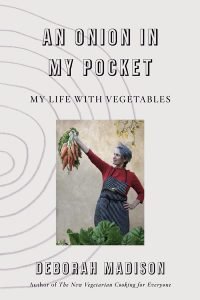
Deborah Madison is best known for the popular cookbook, Vegetarian Cooking for Everyone (originally published in 1997 and revised in 2014). But as the author of 14 cookbooks featuring what she calls “recipes for vegetables,” Madison’s influence has helped bring plant-based cooking to the mainstream. Her newest book is a memoir that recounts her life through the lens of food, beginning with her childhood in Davis, California, and continuing through her long career as a food writer living with her artist husband near Santa Fe, New Mexico. In an unembellished, conversational style, Madison relates the “heady, dazzling experience” of working at Berkeley’s landmark Chez Panisse and the challenge of creating vegetarian menus as the chef at San Francisco’s Greens restaurant, at a time when there was almost no buzz about local and seasonal food. For the first time, Madison details her nearly 20 years as a Zen Buddhist, and describes how the practice helped launch her career. The book closes with a series of descriptions of her most memorable meals, all of which reveal her approach to good food: simple and nourishing, served without labels or rules.
– Lynne Curry
Uncertain Harvest: The Future of Food on a Warming Planet
By Ian Mosby, Sarah Rotz, and Evan D.G. Fraser
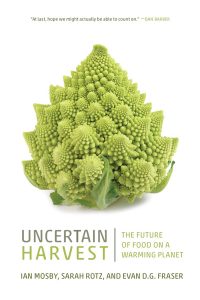
As the climate crisis nears the point of no return and the global population is projected to swell to just under 10 billion by 2050, we’ll be forced to deeply alter the ways we grow and consume the food we eat, and we’ll need a thoughtful plan for how to get us there. That’s exactly what Uncertain Harvest has to offer. In this book, the Canadian authors weave together an array of solutions—from culture to economics—to chart a more resilient and more equitable food future. With a strong focus on concrete solutions, the authors explore a future that builds on questions asked of scientists, chefs, entrepreneurs, farmers, engineers, and philosophers while examining eight key foods that could hold the answers: algae, caribou, kale, millet, tuna, crickets, milk, and rice. If you’ve ever wondered how we’ll feed ourselves in a future that’s uncertain in the extreme, this book is for you.
– Cinnamon Janzer
Notes from a Young Black Chef
By Kwame Onwuachi
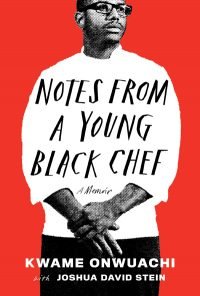
When Kwame Onwuachi was six, he stayed for dinner at his best friend Patrick Gallagher’s house, where he was served an overcooked London Broil. “What’s wrong with this?” he asked Mrs. Gallagher, not realizing the etiquette involved in eating as a guest. “It doesn’t taste like anything!” This anecdote offers an early hint of Onwuachi’s future as a chef who would go on to win the James Beard Award for his Afrocentric fare at D.C.’s Kith/Kin. Written with Joshua David Stein, Notes from the Young Black Chef offers a deep dive into the life of a man raised on Creole cuisine and African stews with no reference point for a bland top round. After growing up in a housing project in the Bronx, attending and getting expelled from college, and falling into drug addiction, it’s clear that cooking was a form of salvation for Onwuachi. One morning, he woke up craving home-cooked food, so he prepared the chicken curry his mom taught him to make when he was a boy. Cooking, he said, “reminded me of real love, not the chemical highs of Ecstasy.” The book details Onwuachi’s path through culinary school and onto globally renowned restaurants including Per Se and Eleven Madison Park. Throughout, he is brutally honest about his life and his experiences with racism in high-end restaurant kitchens. And his mother emerges as a steady force of tough love. She taught him his trade, and she also taught him a lesson he seems to have taken to heart: “No one deserves anything. You get what you work for.” Onwuachi’s engrossing memoir, which also includes recipes for some of his favorite dishes, shows just how hard he has worked to get to where he is today.
– Hannah Wallace
Food Freedom Community
By Isa Pearl Ritchie

Ritchie, who was raised in a Kaupapa Māori environment in New Zealand, writes about how to address hunger through food sovereignty as if she was weaving a traditional raranga-kete basket. The strands she weaves are at turns personal (she was raised in deep poverty), mythological, scientific, ecological, and economic, and they ultimately form a holistic narrative that makes this book both warmly relatable and extensively researched. Food Freedom Community is also a brave book: Ritchie deliberately takes a solutions-oriented approach—not an easy choice, since seeking solutions is, by its very nature, susceptible to failure, whereas critiques of failed systems are relatively safe. But it’s clear that Ritchie has developed a counter-narrative to hopelessness that inspires tangible solutions though compassion, empathy, and inspiration.
– Jake Price
The Reindeer Chronicles: and Other Inspiring Stories of Working with Nature to Health the Earth
by Judith D. Schwartz

If you’re feeling hopeless about climate change, reading The Reindeer Chronicles might show you a new way forward. The book focuses on the simple yet profound idea that our land and how we manage it is central to mitigating climate change. More than 75 percent of Earth’s land area is already degraded due to intensive farming, overgrazing, overuse of water, and development—and the pace of degradation is only accelerating. Instead of dwelling on this grim state, journalist Judith Schwartz takes us on a tour of global land restoration projects—in China, Hawai’i, Saudi Arabia, and Norway—proving through real examples that reversing the damage we have done as humans is possible, including in very harsh or seemingly intractable conditions. The book goes beyond the popular concept of regenerative agriculture and looks at restoration through the wider lens of environmental landscape and ecosystem restoration. Refreshingly, it also offers non-American voices and lessons of Indigenous people’s approaches to land management. It shows that land regeneration can lead not just to higher crop yields or increased carbon capture, but also to the revival of communities and even psychological healing. And, most importantly, the restoration of the water cycle and the return of trees and vegetation can potentially reinstate disrupted weather patterns. From the book’s opening quote—”It’s time to rebuild what has been lost.”—The Reindeer Chronicles offers much-needed hope and inspiration.
– Gosia Wozniacka
A Small Farm Future: Making the Case for a Society Built Around Local Economies, Self-Provisioning Agricultural Diversity, and a Shared Earth
By Chris Smaje

Food system reformers often passionately embrace one solution and then defend it at all costs. In A Small Farm Future, social scientist and farmer Chris Smaje takes a refreshingly different approach, presenting a vision for a radically reimagined holistic system based on small-scale, localized production, while carefully considering his own arguments along the way. Smaje describes a more agrarian existence as a fundamentally practical and urgent answer to 10 systemic crises facing humanity—including those regarding climate change, health, and nutrition. He explains the history and logic of capital and analyzes the claim that agricultural systems should mimic nature. Like well-tended soil, the book’s argument is rich and complex, and Smaje doesn’t allow himself to accept easy answers about what is best or possible when it comes to reimagining farming, and, consequently, modern society. In the end, “it’s surely unlikely that the governments of the world will collectively engineer a wrenching change of course to the capitalist juggernaut and nurture a distributed economy of rural horticulture,” he writes, but it is likely the book will encourage readers to think deeply about what kind of change of course is possible, and maybe even necessary.
– Lisa Held
Living Lively: 80 Plant-Based Recipes to Activate Your Power and Feed Your Potential
By Haile Thomas

Written by 19-year-old vegan activist, motivational speaker, and food and lifestyle influencer Haile Thomas, Living Lively is part cookbook and part workbook. The daughter of Jamaican immigrants, Thomas made a remarkable nutrition journey in 2019, which led her to found The HAPPY Organization to educate youth about their food choices. From the outset, Thomas describes the book as all about self-reflection, self-love, and self-empowerment. “It’s got a lot to do with self . . . and that ain’t selfish!” she writes. Living Lively contains 80 wholesome, plant-based recipes (paired with beautiful photos), including Chickpea-Power Pancakes, My Mama’s Jamaican Rice and Peas with Curry Mushrooms, and Korean Jackfruit Sloppy Jills. Thomas also includes coaching around what she defines as the “7 Points of Power”—spiritual, emotional/mental, physical, intellectual, environmental, social, and financial wellness—and includes writing prompts and blank spaces to explore these concepts. With the dynamic, bubbly, and supportive Thomas as a guide, Living Lively’s readers are encourages adopt a healthy and nourishing lifestyle.
– Christina Cooke
In Search of the Wild Tofurky: How a Business Misfit Pioneered Plant-based Foods Before They Were Cool
By Seth Tibbott
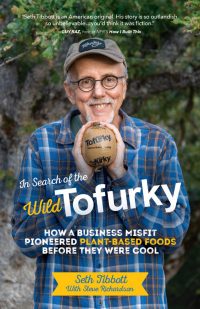
It may surprise you to learn that Seth Tibbott, founder of Tofurky, was raised on chopped sirloin steaks and “hamburger pizza.” In college, he had a food epiphany that would change not only his meat-focused diet, but also the course of his life. A lithe, blue-eyed art major cooked him a memorable meal of lentils with onions and rice (she’d found the recipe in Francis Moore Lappé’s Diet for a Small Planet) and, as they ate, sold him on Lappé’s key thesis: You can have a healthy, protein-rich diet without meat. Before long, Tibbott had become a vegetarian—albeit, he admits, a lousy one. In this lively and laugh-out-loud funny memoir, Tibbott shares his adventures as a mandolin-playing outdoor school counselor in Ohio whose countercultural lifestyle leads him to discover the fermented soybean product known as tempeh. With nothing but $2,500, a used refrigerator-cum-incubator, and the conviction that tempeh would become the next granola, Tibbott starts the plant-based protein company that will eventually be known as Tofurky. Tibbott’s memoir gives new meaning to the word “bootstrapped:” He rented his first commercial space from a local food co-op for $25 a month, did all his own tempeh deliveries, and saved on rent by living in a treehouse for seven years. Though there’s business advice embedded throughout the book, he also ends each chapter with a pithy 20/20 hindsight section full of big-picture wisdom. And they may be worth listening to: Today, Tofurky, a certified B Corporation, is a global brand valued at more than $120 million, and it’s still entirely owned by the Tibbott family.
– Hannah Wallace
Hungry: Avocado Toast, Instagram Influences, and Our Search for Connection and Meaning
By Eve Turow-Paul
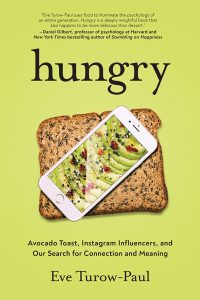
This globe-trotting, data-packed book is a psychographic deep dive into foodie culture with trend researcher Eve Turow-Paul. What she learns on her travels—to a arrange of places including a vegan speed-dating event in New York, a high-tech free-range chicken farm in China, and a bakery in Los Angeles—is that what drives the food obsessions of Millennials and Generation Y is more than physical hunger. She builds a compelling connection between cravings for cold brew coffee, kale, sushi, and unicorn cakes—and all of the associated lifestyle trends—with these generations’ deeper needs for control, belonging, and purpose in the Digital Age. Loaded with evidence—including her own Hungry Study conducted with the research firm Datassential—Turow-Paul’s narrative establishes how smartphones and other technology have fostered a population that is overloaded, time-crunched and distracted. And the nourishment they seek is a sense of well-being, identity, and meaning in their lives.
– Lynne Curry
Grocery Activism: The Radical History of Food Cooperatives in Minnesota
By Craig B. Upright
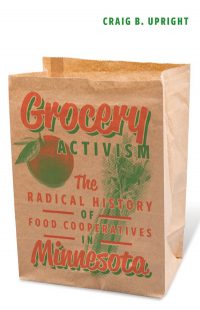
Most American consumers take organic agriculture, the fastest-growing segment of our food industry, for granted. But decades before there was a green-and-white USDA label to vouch for federally mandated farming standards, organic was shaped by its early proponents—a large number of whom hailed from the strongly progressive farmer/activist state of Minnesota. Their goal, writes sociology professor Craig Upright in the introduction to his first book, was to “elevate the practice of sustainable farming as a responsibility we all share to promote the health of consumers, farm laborers, and all citizens of the Earth.” These early organic pioneers pushed forward their agenda in part by founding cooperative grocery stores, 60 of which opened in the state between 1960 and 1970. Grocery Activism is a fascinating look at how parallel movements gave rise to two big and important ideas—cooperatives and organics—as well as a subtle guide to how proponents of both might move forward in the era of Amazon.
– Lela Nargi
Our 2020 Book Coverage

Healthy at Last: A Plant-Based Approach to Preventing and Reversing Diabetes and Other Chronic Illnesses
By Eric Adams
In his new book, the Brooklyn Borough president chronicles his journey from a diabetes diagnosis to restored health, and maps a path for communities of color to healthy eating, even in food swamps.
– Nadra Nittle
Let’s Ask Marion: What You Need to Know about the Politics of Food, Nutrition and Health
By Marion Nestle
In her latest book, the nutrition expert answers all your burning food policy questions—and makes a case for a singular national food policy agency.
– Kerry Trueman
Perilous Bounty: The Looming Collapse of American Farming and How We Can Prevent It
By Tom Philpott
The veteran food writer warns that the current trajectory of farming in California’s Central Valley and the Corn Belt could be setting us up for collapse.
– Twilight Greenaway
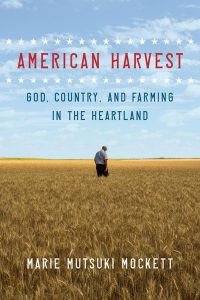
American Harvest: God, Country, and Farming in the Heartland
By Marie Mutsuki Mockett
The author traveled with a team of wheat harvesters from Texas to the Dakotas, catching a rare glimpse of modern farm life and gaining valuable insight into the urban-rural divide.
– Twilight Greenaway
Billion Dollar Burger: Inside Big Tech’s Race for the Future of Food
By Chase Purdy
A new book explores the companies at the forefront of cell-based meats, their “ick” factor, and the billionaires invested in bringing them to market.
– Nadra Nittle
Salmon: A Fish, the Earth, and the History of Their Common Fate
By Mark Kurlansky
The story of salmon also traces the ways economic development threatens salmon—and what that pattern means for humanity’s survival.
– Lisa Held

Harvest the Vote: How Democrats Can Win Again in Rural America
By Jane Kleeb
In her new book, the chair of the Democratic party in Nebraska, says unlikely alliances are the way forward for environmental protection, small family farmers, and immigrant communities.
– Twilight Greenaway
Published at Mon, 30 Nov 2020 09:02:19 +0000




Comments
Loading…